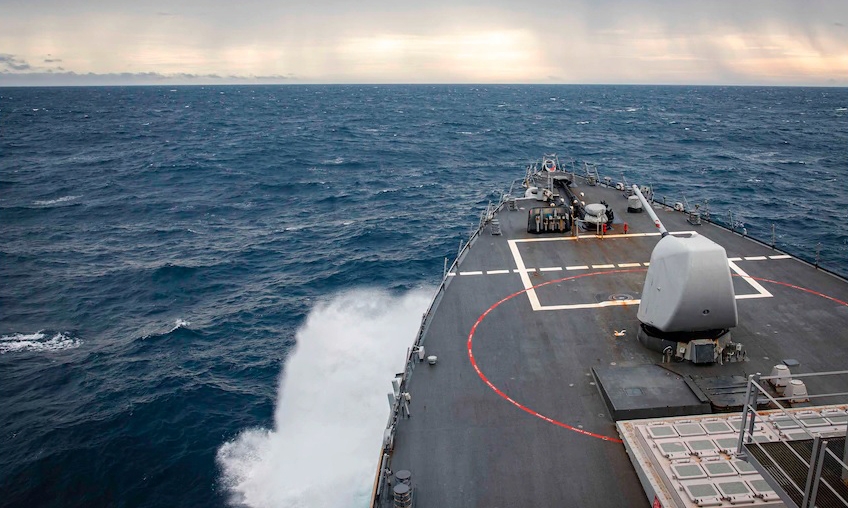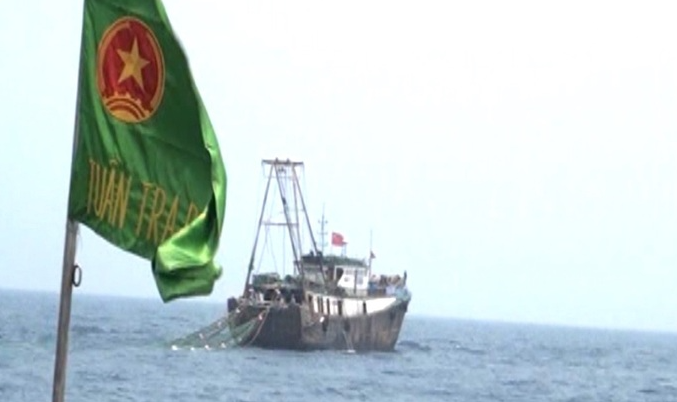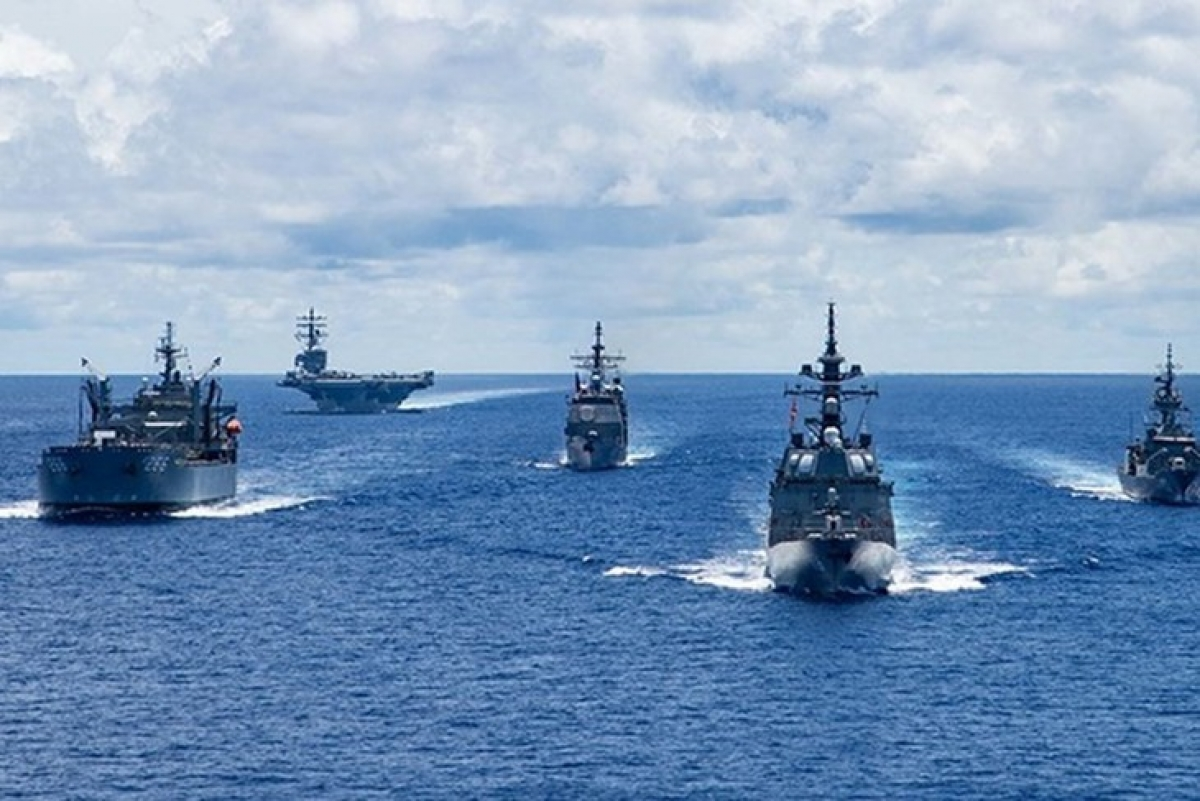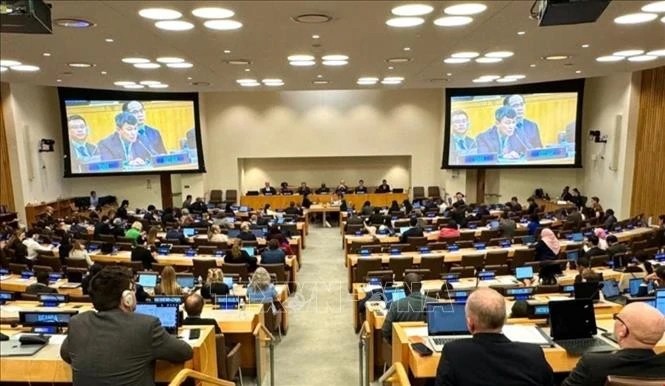South China Sea (Bien Dong Sea): battle of diplomatic notes and law-abiding spirit
| US destroyer sails near the Spratly Islands | |
| Vessels with Chinese flags chased away from Vietnamese seas | |
| South China Sea 2020 - From diplomatic note to the rule of law |
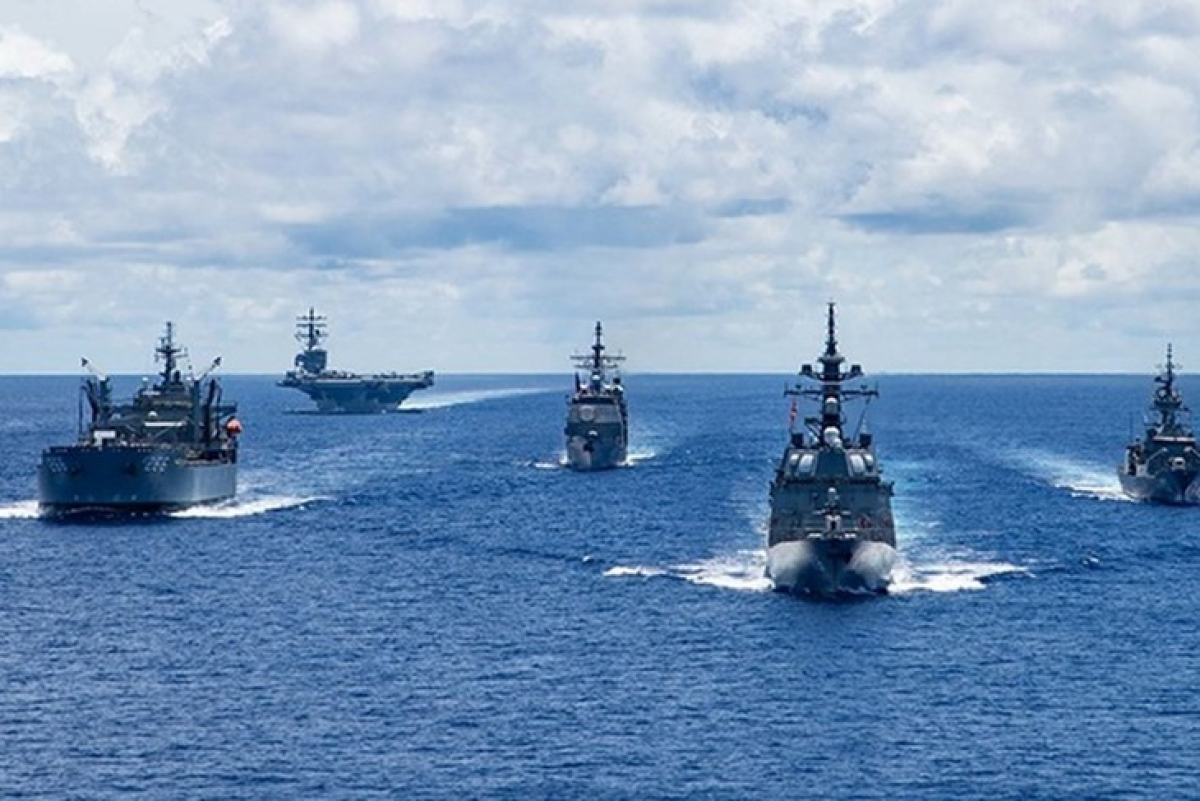 |
| Warships of Australia, the US, and Japan conduct a drill in the Philippine Sea, near the East Sea in July, 2020. Photo: US Navy |
In a year fraught with uncertainty and an unending stream of challenges, not even a pandemic was enough to stop China’s aggressive behavior in the South China Sea, Rappler reported.
Out in high waters, rather than a slow down of patrols or reported military activity, defense and foreign ministries across the world seemed active as ever.
China’s aggressive behavior in South China Sea
A recent study from the Asia Maritime Transparency Initiative of the Center for Strategic and International Studies (AMTI-CSIS) in Washington tracked this, finding that the China Coast Guard (CCG) continually deployed ships around “symbolically important features” on a nearly daily basis in 2020 – just like it did last year.
In some cases, patrols even increased, especially in the case of Panatag Shoal (Scarborough), with at least one CCG vessel spotted in 287 of the last 366 days, AMTI said, marking a climb from the 162 days recorded in 2019.
For military activities, the waterway was similarly busy. The AMTI found both China and the United States upped their public announcements on defense engagements in the South China Sea. Against this backdrop, the two world powers already saw tensions soar as they clashed on multiple fronts like technology and trade.
But in spite of these moves, countries in Southeast Asia and far beyond found ways to push back against China.
Defending their rights, countries asserted the rule of law in the quiet corners of multilateral offices or before leaders on the world stage. Just as China pushed on with its might in the South China Sea, the year saw more countries take a stand on Beijing’s actions in the vital waterway.
Battle of diplomatic notes
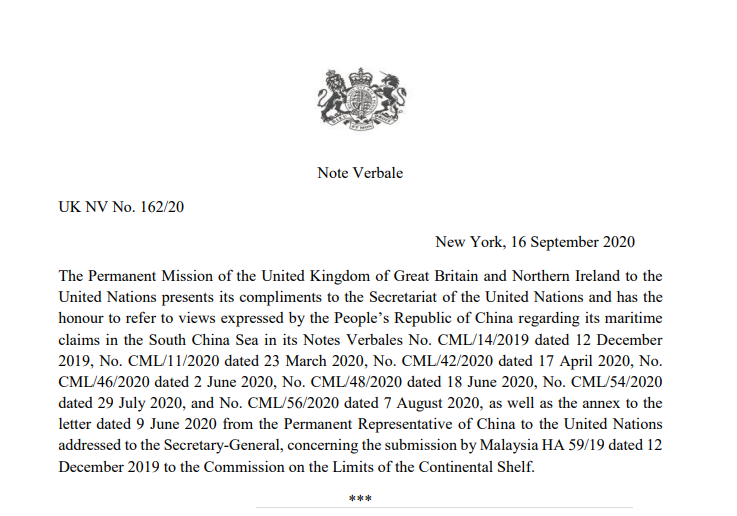 |
| A note verbale addressed to the United Nations |
At least 10 countries, including the Philippines, Malaysia, Indonesia, the US, the UK and Fance, joined in on a salvo of diplomatic notes that called out China’s claims in the South China Sea.
While the list of countries calling out China's actions has grown, not all countries reached the same degree of opposition against China.
For instance, some countries like Indonesia have implied that Beijing should comply with the 2016 arbitral ruling, while some like the Philippines and the US have explicitly said China should respect the decision.
The Philippines is one of the countries with a wide-ranging position rejecting nearly all aspects of China’s claims. In August, Philippines Defense Secretary Delfin Lorenzana said China's so-called historical rights over an area enclosed by the "nine-dash line" doesn't exist except in the country's imaginations.
China's "nine-dash line" used to claim most of the South China Sea is a fabrication, he said.
The one aspect where most countries agreed was in asserting that China’s “historic rights” to the strategic area were illegal. This much was settled in the 2016 arbitral award that struck down China’s 9-dash line as unlawful.
But even with differences among countries' positions, the AMTI pointed out that the filing of diplomatic notes this year was a “crystallizing moment” for the South China Sea disputes. Through notes verbales at the UN CLCS, several countries – some for the first time – publicly clarified their positions on the issue.
“In this latest episode, parties are finally addressing the merits of that award as well as some alternative legal theories that China has floated to explain its claims,” AMTI-CSIS said.
Never greater efforts
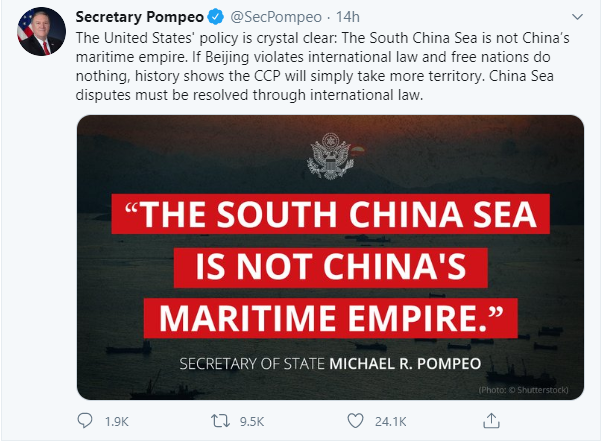 |
| Mike Pompeo said in a tweet that the South China Sea is not China's maritime empire. |
The year 2020 witness the never greater efforts by the US in pushing back against China in the South China Sea.
The US’ statement released last July 13 emphasized that not only were China’s claims to offshore resources in the maritime area illegal, so was its “campaign of bullying to control them."
US Secretary of State Mike Pompeo said on July 25 that the South China Sea is not China’s maritime empire.
The timing of America’s message was significant, coming out the day after the 4th anniversary of the 2016 arbitral award on July 12. While the US State Department's latest position was not a “radical break” from past US administrations, foreign policy experts emphasized that the announcement was the strongest and most explicit support expressed by Washington for the 2016 Hague ruling.
It also served as a starting point for further action by the US government and other world powers in Europe.
This was seen in August, when the US State Department and Commerce Department sanctioned 24 Chinese companies linked to Beijing’s island-building campaign in the South China Sea.
A month later, naval powers France, Germany, and the United Kingdom added their weight to increasing world pressure against Beijing’s actions in the area through a joint note verbale to the UN. The countries – collectively known as E3 – reaffirmed their positions on the dispute and stressed the need to abide by the rule of law.
Before the year ended, more European countries also started to develop their own Indo-Pacific strategies. This was in recognition of the great significance of the South China Sea since some 50 pểcnt of the European Union’s maritime trade crosses the waters annually.
A most notable highlight in the year was also President Rodrigo Duterte’s move to use the United Nations’ 75th General Assembly to raise the Philippines' legal victory against China involving the South China Sea.
"The Award is now part of international law, beyond compromise and beyond the reach of passing governments to dilute, diminish, or abandon….We firmly reject attempts to undermine it,” Duterte declared.
The statement was a milestone, considering that since the start of his term in 2016, Duterte shelved the ruling in exchange for economic benefits from China. The President had likewise repeatedly raised the false threat of war as an excuse for refusing to assert the rights of the Philippines.
Law-abiding spirit
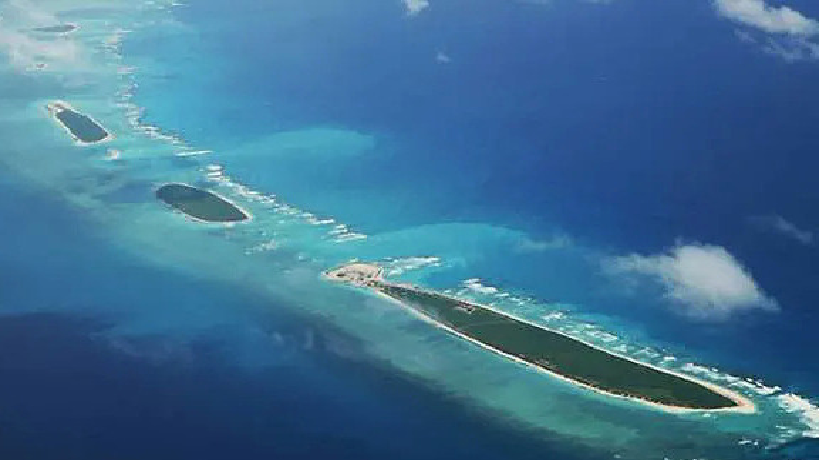 |
| Paracel Islands in the South China Sea. (Photo: AFP) |
Maritime law expert Jay Batongcal from the University of the Philippines College of Law stressed that moves taken by countries to state their positions on China’s claims mattered in putting up a united front that could put increasing pressure on Beijing.
“For the Southeast Asian countries as well, they can actually now fully state that there is no support at all for China’s position and legally, there is no way by which China can claim a basis in international law even if they resort to invoking general international law,” Batongbacal said in a recent webinar hosted by the ADR Stratbase Institute.
“There is nothing there that supports China’s legal position,” he added.
Leading South China Sea analyst Gregory Poling of the AMTI-CSIS echoed this, saying a broad coalition was necessary to push back against China's aggressive behavior in the region.
"If China sees that its behavior in the South China Sea undermines its goals of being a world leader, then it will compromise. If the South China Sea doesn’t undermine its global ambitions, then it will keep up its aggression," Poling told Rappler in an earlier interview.
Poling said, "China needs to be treated the same way the international community treats other states like Russia, Iran, or for that matter the US and UK when they have lost international arbitrations. Instead we keep giving Beijing special treatment."
The two legal stalwarts often pointed out that having countries back the award and oppose China's behavior was one of the best ways to enforce the landmark 2016 Hague ruling.
In a webinar hosted by UP Law, law of the sea expert James Kraska took stock of the progress made in the last year, citing the positive backing of the UK, France, Germany, and countries like Indonesia in Southeast Asia voicing their support for the decision in the arbitral award.
Kraska counted it as “a victory for building of norms and building of deterrence.”
However, he said, a long-term game and this could be a game of decades.
“We’re in a long-term struggle…. As part of this lawfare we have to be patient in the struggle for law just like we’re patient in the struggle for power and balancing hegemony and aggression,” he said. /.
 | Vietnam verifies information on high radioactive concentrations in Bien Dong Sea According to the Spokesperson for Ministry of Foreign Affairs, Vietnam is verifying information about the abnormally high concentration of radiation iodine-129 on Bien Dong Sea. |
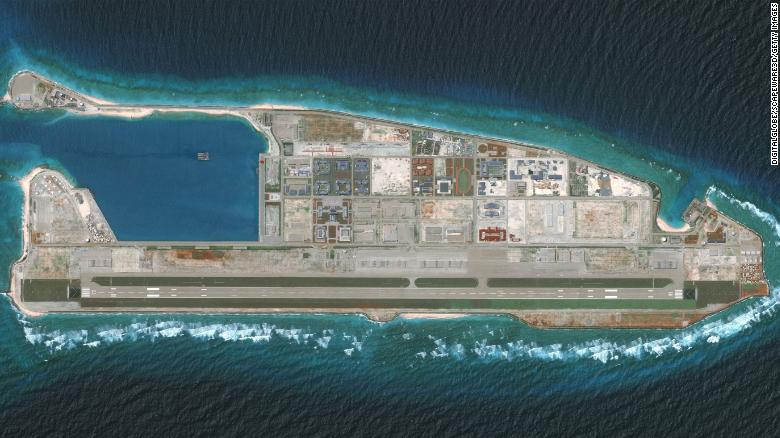 | China’s military bases in South China Sea (Bien Dong Sea) vulnerable to be attacked: report Beijing has spent years turning islands and reefs in the South China Sea (called Bien Dong Sea in Vietnam) into military bases and airstrips - ... |
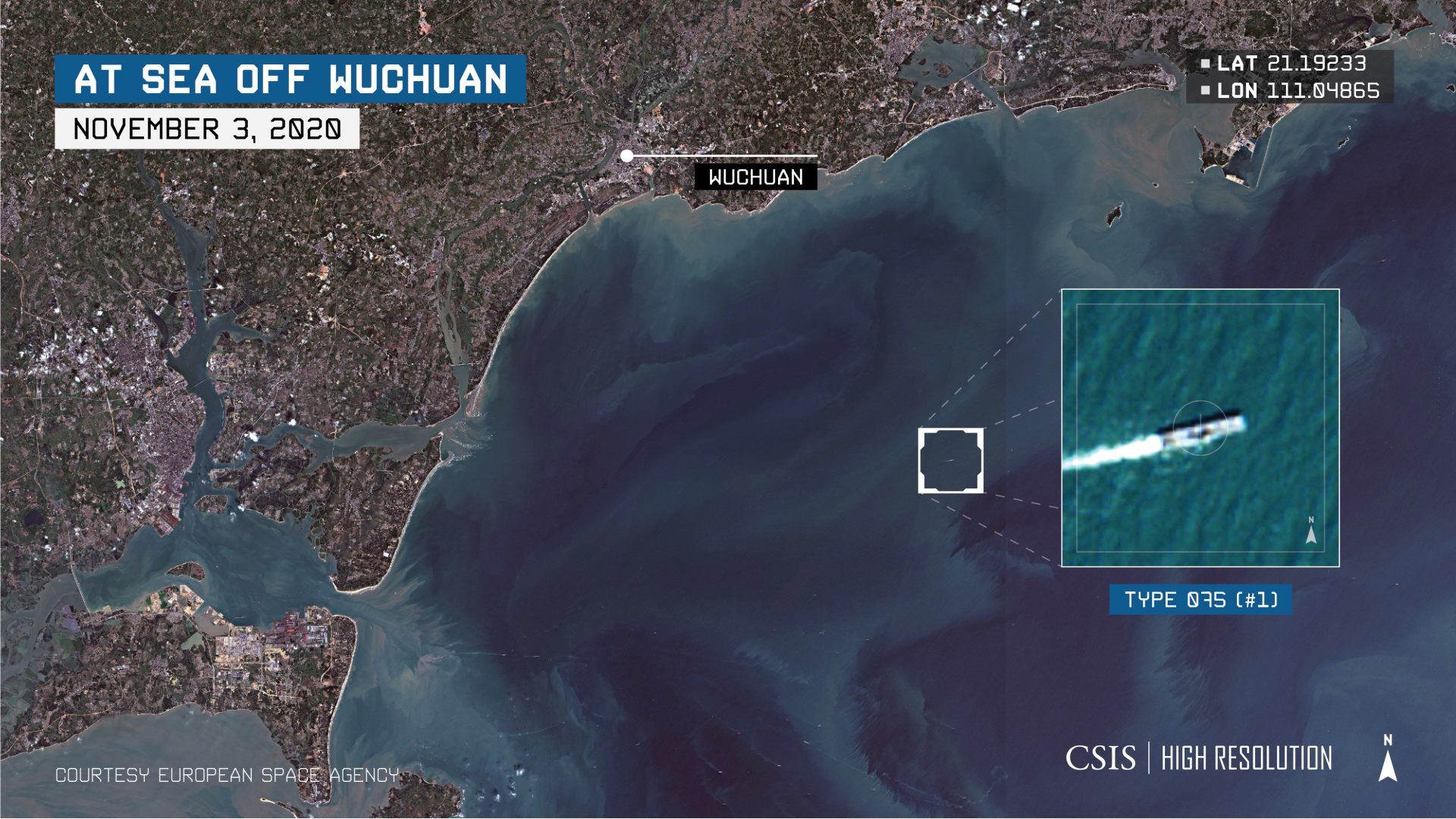 | China’s amphibious assault ship sails into the South China Sea (Bien Dong Sea) The first of China’s new Type 075 landing helicopter dock (LHD) appears to have recently embarked on a second round of sea trials—this time in ... |
Recommended
 Seas and islands
Seas and islands
Vietnam Endorses Common Voice on Ocean Jurisdiction
 Seas and islands
Seas and islands
Dialogue as Key to Settling Disputes and Advancing Law of the Sea
 Seas and islands
Seas and islands
RoK Navy Ship Pays Friendly Visit to Da Nang City
 Seas and islands
Seas and islands
Naval Region 5 Promotes Reading Culture, Fosters Patriotism
 Seas and islands
Seas and islands
Coast Guard Region 2 Command Hosts Philippine Coast Counterpart
 Seas and islands
Seas and islands
Vietnam - Thailand Navy: Coordination to Well Address Problems at Sea
 Seas and islands
Seas and islands
Honoring the Fallen: Incense Offering for the 37th Anniversary of Gac Ma
 Seas and islands
Seas and islands

